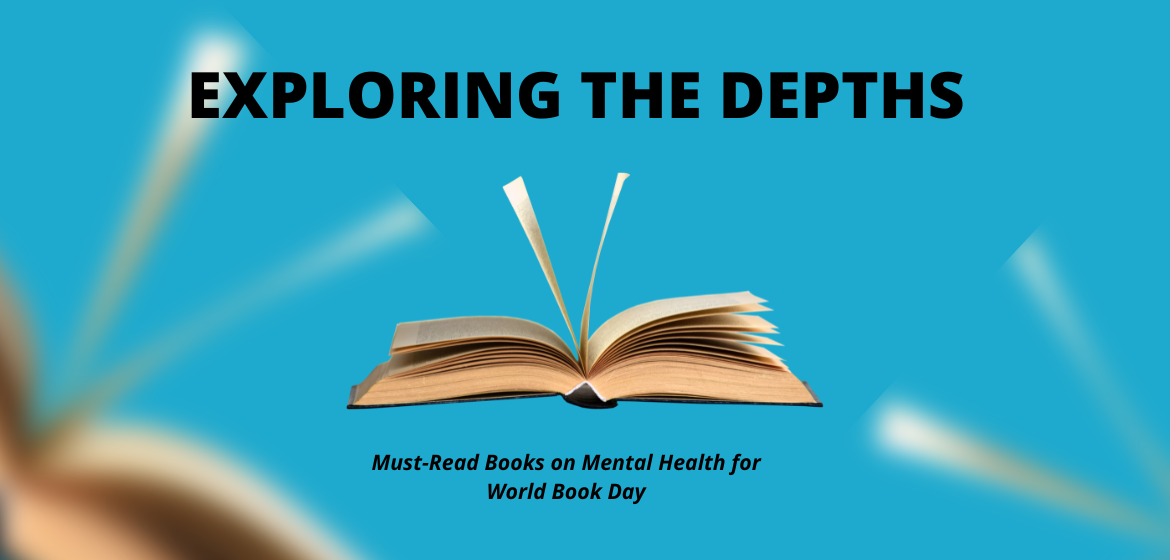
Exploring the Depths: Must-Read Books on Mental Health for World Book Day
In the realm of mental health, understanding the complexities of our minds and bodies is crucial for fostering well-being and resilience and books are a great way to delve into it more. Gabor Maté, Bessel van der Kolk, and Johann Hari are three influential authors who offer profound insights into the intricacies of mental health and provide valuable perspectives on addressing its challenges. Through their books (and given World Book Day), they illuminate the connections between mind, body, and environment, offering pathways to healing and personal growth. Here are some recommendations for you to explore on World Book Day.
When the Body Says No: Exploring the Stress-Disease Connection
Gabor Maté, a renowned physician and author, delves into the profound interplay between emotional experiences and physical health in his book “When the Body Says No: Exploring the Stress-Disease Connection.” Maté’s work emphasises the importance of understanding how unresolved emotional issues can manifest as physical ailments. He explores the impact of chronic stress on the body’s immune system, drawing attention to the role of emotions in shaping our health outcomes.
Maté’s insights challenge conventional views on the mind-body connection, highlighting the need for holistic approaches to healing that address both emotional and physical well-being. By recognising the link between stress, emotions, and disease, individuals can cultivate greater awareness of their inner experiences and take proactive steps towards health and healing.
Some of the key lessons from his book include:
- Mind-Body Connection: The book emphasises the link between chronic stress and various illnesses. This insight encourages paying attention to the body’s signals and recognising how stress might manifest physically and emotionally.
- Importance of Self-Awareness: The book encourages introspection and understanding of how individual experiences, especially early childhood, shape emotional responses and coping mechanisms. Identifying these patterns can help manage stress more effectively.
- Healing Through Expression: The book highlights the importance of expressing emotions healthily, including negative ones, to prevent them from becoming suppressed and contributing to stress.
- “The Seven A’s of Healing”: This framework outlined in the book provides a roadmap for addressing chronic stress and promoting personal well-being. It includes:
-
- Awareness: Recognising stress triggers and reactions.
- Acceptance: Accepting the reality of one’s situation without judgment.
- Authenticity: Living life authentically and expressing true needs.
- Assertion: Setting boundaries and communicating needs effectively.
- Altruism: Engaging in meaningful activities that benefit others.
- Autonomy: Taking responsibility for one’s choices and life direction.
- Advocacy: Speaking up for oneself and others.
- Importance of Seeking Help: The book acknowledges that healing can be a complex process. It encourages seeking professional help from therapists or counselors when needed for deeper exploration and personalised guidance.
The Body Keeps the Score
Bessel van der Kolk, a leading expert in trauma research and treatment, offers a groundbreaking perspective on the effects of trauma in his seminal work “The Body Keeps the Score: Brain, Mind, and Body in the Healing of Trauma.” Drawing from decades of clinical experience and research, van der Kolk explores the profound impact of trauma on the brain, body, and psyche.
Van der Kolk emphasises the importance of understanding trauma as a whole-body experience, highlighting how traumatic memories are stored in the body and can manifest as physical symptoms. He explores innovative therapeutic approaches that integrate somatic experiencing, mindfulness, and neurofeedback to address trauma and promote healing.
“The Body Keeps the Score” offers hope and empowerment to individuals struggling with the effects of trauma, providing insights into the transformative potential of holistic approaches to healing. By recognising the interconnectedness of mind, body, and spirit, individuals can embark on a journey towards reclaiming their sense of wholeness and well-being.
Some of the key lessons from the book are:
“The Body Keeps the Score” by Bessel van der Kolk offers valuable insights for everyday mental health, even for those without experiencing explicit trauma. Here are some key takeaways:
- The Mind-Body Connection: Similar to “When the Body Says No,” this book emphasises the interconnectedness of mind and body. Recognising how your thoughts and emotions relate to your physical sensations is crucial for understanding your overall well-being.
- Building Resilience: The book explores how experiences, both positive and negative, can shape our nervous system and emotional responses. Learning to regulate your nervous system through mindfulness techniques, deep breathing, and body awareness can increase resilience against everyday stressors.
- Importance of Movement and Connection: The book explores how movement practices like yoga, dance, or mindful exercise can help process emotions, regulate the nervous system, and connect with your body. Additionally, fostering healthy relationships and social connections can also contribute to emotional well-being.
- Understanding Emotional Responses: Learning to identify and validate your emotions, even negative ones, is crucial for healthy emotional processing. By understanding the sources of your emotional responses, you can develop healthier coping mechanisms and avoid unhealthy suppression.
- Recognising “Stuck” Patterns: The book discusses how trauma or challenging experiences can lead to repetitive patterns of thoughts, emotions, and behaviours. Recognising these patterns allows you to break free and develop more adaptive strategies for managing daily challenges.
Lost Connections
Johann Hari’s book “Lost Connections: Uncovering the Real Causes of Depression – and the Unexpected Solutions” offers a provocative exploration of the societal and environmental factors contributing to depression and anxiety. Hari challenges conventional views on mental illness, arguing that depression is not solely a result of chemical imbalances in the brain but is often rooted in broader social and cultural contexts.
Drawing from personal stories and scientific research, Hari explores how disconnection from meaningful work, social support, and a sense of belonging can contribute to feelings of despair and hopelessness. He highlights the importance of addressing underlying social and environmental factors in the treatment of depression, advocating for a holistic approach that prioritises connection, meaning, and community.
“Lost Connections” offers a powerful critique of the prevailing medical model of mental illness and calls for a paradigm shift towards more compassionate and inclusive approaches to treatment. By recognising the role of social and environmental factors in shaping mental health outcomes, individuals can work towards creating communities that foster connection, resilience, and well-being.
What can you take from this book?
- Nurture Your Relationships: Invest time and effort in strengthening relationships with loved ones. Engage in meaningful conversations, offer support, and participate in shared activities. Consider joining clubs or groups that align with your interests to build a broader social network.
- Find Purpose and Meaning: Explore your values and interests. Pursue hobbies, volunteer for causes you care about, or set personal goals that give your life a sense of direction and accomplishment. Consider how your work or studies can contribute to something larger than yourself.
- Connect with a Larger Cause: Find ways to contribute to a cause or community that resonates with you. This could involve volunteering, participating in activism, or engaging in activities that support your local community.
Harnessing World Book Day For Your Mental Health
In conclusion, the works of Gabor Maté, Bessel van der Kolk, and Johann Hari offer valuable insights into the complexities of mental health and provide pathways to healing and personal growth. By recognising the interconnectedness of mind, body, and environment, individuals can cultivate greater awareness of their inner experiences and take proactive steps towards well-being. Especially on World Book Day their works are worth exploring to learn and discover more about yourself.
Looking for more books? Over the last few years we’ve put together a series of articles for World Book Day that may be worth a read.
























